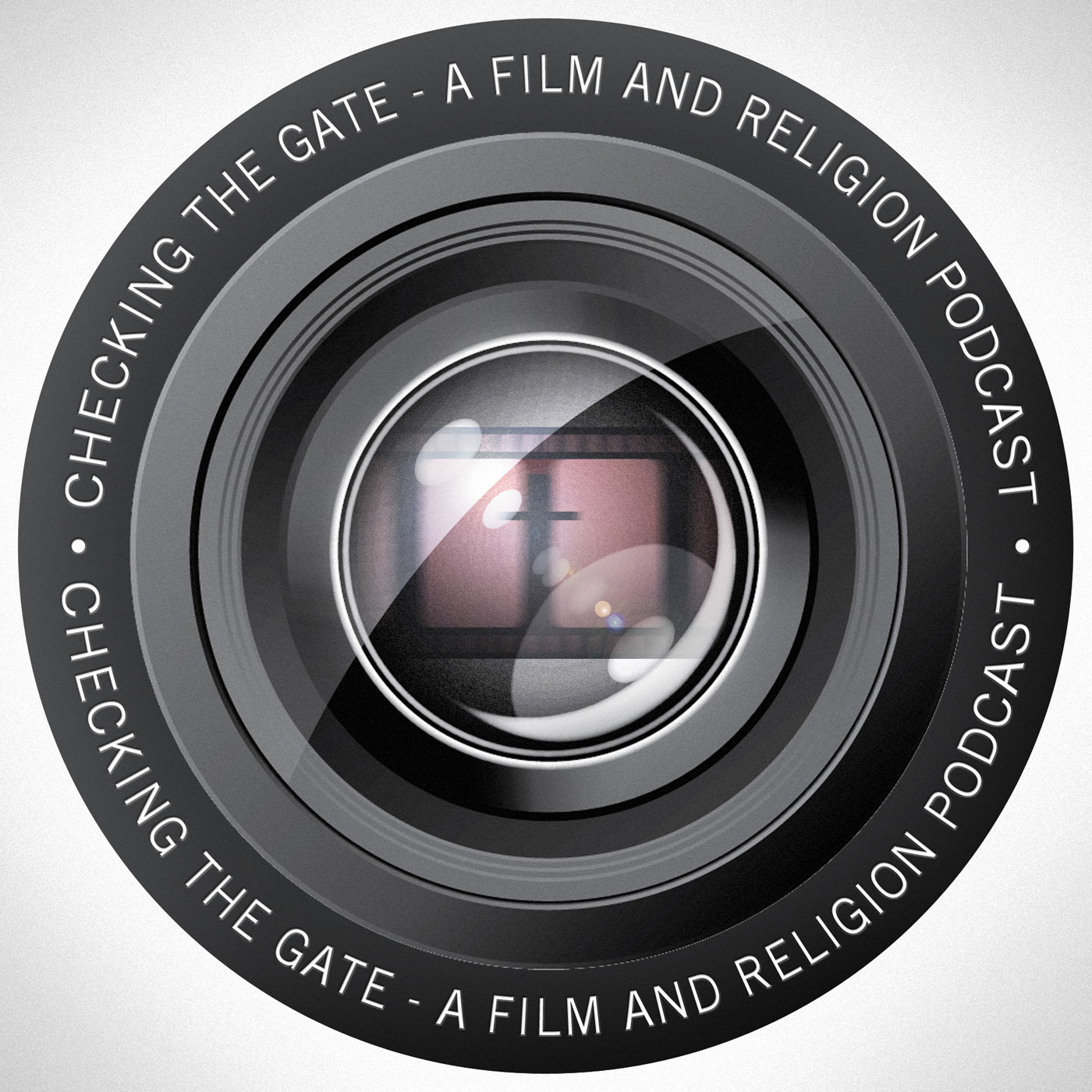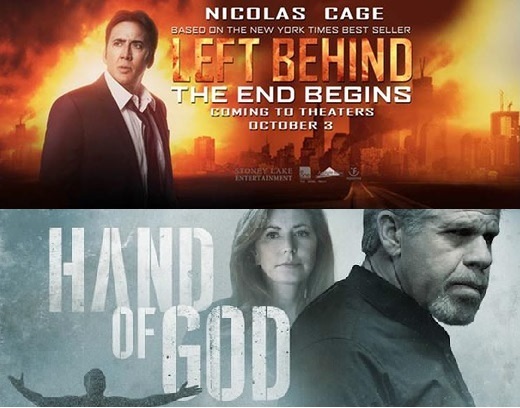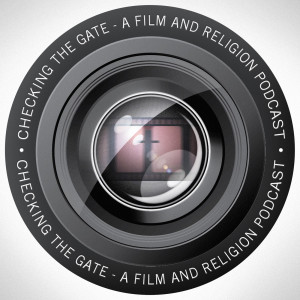
13.7K
Downloads
65
Episodes
This is a show for those spiritual people who love film, and also those cinefiles feel that there is more to life than what we know. Each month, Robert and Mike will creativly evaluate a new film.
This is a show for those spiritual people who love film, and also those cinefiles feel that there is more to life than what we know. Each month, Robert and Mike will creativly evaluate a new film.
Episodes

Wednesday Dec 02, 2015
Episode 42: Star Wars: The Mythology
Wednesday Dec 02, 2015
Wednesday Dec 02, 2015

Star Wars is built from the many myths and religious themes that run through human history. George Lucas said he "Tried to tell an old story in an new way." In this month's episode, we examine just how Lucas pulled upon the work of his friend and mentor Joseph Campbell, the world's leading expert in the study of myth. We talk about how the myths of old informed the two trilogies, and speculate about how mythology and religion may (or may not) inform The Force Awakens.

Sunday Nov 01, 2015
Episode 41: Left Behind
Sunday Nov 01, 2015
Sunday Nov 01, 2015

Hello, and welcome to the (once again) monthly CTG Podcast. This month’s offering is the Christian reboot
of Left Behind (2014) starring
Nicholas Cage. In TV Corner we watch the
Amazon original series “Hand of God.” Well, we watched part of it. One episode was quite enough. Also, remember almost exactly a year ago when
I recorded a rant essay imploring you to not go to see the movie we are
reviewing this month. Mike and I have
bravely jumped on the grenade; we watched it so you don’t have to. But it’s fun to listen to us argue about who
hates it more. Here’s some of the things we refer to along the way.
Christian Movies at the Box Office - Box Office Mojo
The 20 Best End-of-the-World Movies :: Blogs :: List of the Day :: Paste
Is Religion the New Fad in Hollywood?
Three Reasons Not to See the Christ-ploitation Film Left Behind
Christian eschatology - Wikipedia, the free encyclopedia
Hand of God (TV Series 2014– ) - IMDb
You will want to tune in for the next few months. In anticipation of what is predicted to be the biggest release of the year (decade? all time?), we are going to do a whole series on the religious aspects of Star Wars. The next three episodes, which will be our own Star Wars trilogy, will first focus on the mythological aspects of Star Wars informed by the work of Joseph Campbell. The December episode will look at the effects that Star Wars has had on religious beliefs in the world. Finally, we will give our review of the new film Star Wars: The Force Awakens in January. So until next time, may the force be with you!

Thursday Oct 01, 2015
Episode Forty: Calvary
Thursday Oct 01, 2015
Thursday Oct 01, 2015

Hello faithful listeners! Sexual abuse in the church is a serious issue which continues to persist. There are no easy resolutions. Even so, it seems as if the church is slow to satisfactorily work towards ending these despicable crimes, slow in punishing those who perpetrate them, and also in preventing them from happening in the future. This month’s film, Calvary, shines a light into the dark heart of this problem. While this movie focuses on a negative event that the Catholic Church is dealing with right now, our TV Corner looks at the positive aspects of a prominent Catholic family on the CBS procedural show “Blue Bloods”
Next month, we look at the film we told you not to watch, Left Behind (2014) starring Nicholas Cage. And in TV Corner we will examine the new Amazon series “Hand of God.” After that, we are going to close out the year with a three episode series covering the religious and mythological aspects of The Star Wars Saga, culminating with a review of Star Wars: The Force Awakens. It will be our Star Wars trilogy, if you will.
Finally, a quick note about the sporadic nature of our podcast in the last year. Mike and I had various health issues and family tragedies hinder us; I (Robert) had to have eye surgery to correct a detached retina this summer. We are both feeling fit and eager to get back on schedule and will endeavor to stay on target going into 2016. Blessings!

Sunday Jul 05, 2015
Sunday Jul 05, 2015
By Robert Wright-Stasko
San Diego Comic Con 2015 is right around the corner. I am expecting that this year, just like the last several years, there will be some Christians with poorly thought out slogans slapped onto protest signs, with big bullhorns causing brouhaha for comic book fans, cosplayers, and anyone else at the convention trying to have an enjoyable week. I question these protesters; is this the most effective way to get your message across? More to the point, is cosplaying and other such activities even worth protesting? This blog post will answer these questions. In the process, I suggest that we, as Christians, can learn from cosplayers how we can live out some important illustrations in the Bible that will help us follow Jesus Christ more effectively, and therefore, become more Christ-like ourselves. But first, let’s look at some of the protests that have already happened at SDCC.
A History of Protest
The first major protest (in terms of press coverage) was at the 2010 SDCC. The Westboro Baptist Church had sent just a few people, but they did quadruple duty holding as many as four signs each.[1] All of these had the standard, hatemongering slogans that Fred Phelps’ church usually employs at US soldiers’ funerals like, “God hates you,” “God hates fags,” and other deplorable sayings. They stated that their main objection was that being a comic book fan was akin to idolatry,[2] but all those other hate issues got muddled up into their message as well. According to several accounts,[3] these protesters were severely outnumbered by the many comic fans who came prepared with their own signs which they hastily cobbled together (I don’t blame them for their hurriedness, their main concern was probably getting their costumes ready in time to stand in line all day for Hall H). Some were actually pretty clever, like “Galactus is Nigh” and “God Hates Jedi” brandished by a Star Trek cosplayer. Depending on which account you read, the reaction was either good natured with a few exceptions or pretty heated.
Since that year, you can search the internet to find articles where other conservative Christian groups try to get in on the game. It seems to be a different group each year.[4] In 2013, an atheist named Brian organized his own protest, with signs as fancy as the conservatives’ were. But Brian makes a good point when he says, “Atheists don’t show up a churches and try to convince people that their story is nothing more than a story.”[5] Still that did not dissuade other protesters from showing up last year to the 2014 SDCC, yelling at people for not only idolatry, but slinging sexist and homophobic slurs out into the crowd.[6]
But Bleeding Cool News did do a well-balanced report on two protesters at the 2014 SDCC who were not so polarized, and both seemed to be saying things that were not antagonistic. Joe Gaona was there not to protest, but to try to spread the Gospel. Shannon Dove was there to spread awareness for an LGBTQ rights advocates group called Canvass for a Cause. Both were Christian.[7] Yet, because of the tactics used (mainly signs and bullhorns) I seriously doubt that any kind of mutual understanding, or even a simple understanding of the opposing viewpoint, was reached.
A Personal Note on Protesting
While the main focus here is on the effectiveness of protesting, something has to be said about the underlying issue at the heart of these protests, and it is the gay rights issue. As you can see from the history of the SDCC protests, it tends to surface no matter what the protesters might actually be trying to say. The Christian church in America is right now polarized over this matter. Many church denominations have split up or formed new denominations because people cannot agree. This isn’t the first time the church has splintered over disagreements. In America, the issue of slavery caused many fractures in the 1800’s,[8] as well as speaking in tongues (the God gifted ability to speak in another language).[9] But the last time an issue caused this kind of protest was the abortion debate. This is still a hot topic, but not as much as it was a few decades ago.[10]
I recently graduated from a Christian university, and I would commute once a week to attend my classes there while I was a student. Every now and again, on my drive into school, I would spy one or two, sometimes half a dozen people with protest signs in front of the Planned Parenthood across the street from the main campus. I didn’t think much of it, until I started pondering, “Why did Planned Parenthood decide to set up shop across the street from a Christian school?” Please understand, the university taught very good theology that was grounded in Scripture without adding conservative or fundamentalist dogma to it. It gave me very practical insights into demonstrating the love of Christ in a real way while doing ministry for his church. It even held a seminar where two prominent gay Christian theologians debated the issue of gay marriage in the church. This is a Christ centered, yet forward thinking school.
But that question still ate away at me. In its student code of conduct, the university states that sexual activity is solely reserved for marriage. While this is certainly an ideal, it is more often now days not the reality. I started to imagine a young woman and young man from a church background, starting classes at this school, then meeting one another and falling in love. They give in to that love and find out a baby is on the way. Then to avoid anger or embarrassment from their conservative families or even expulsion from the school, they decide to visit the Planned Parenthood across the street. I imagined that they would sneak in the back entrance while their parents were busy toting protest signs and yelling at cars on the street through their bullhorn. Instead of seeking love and forgiveness, knowing they would probably find none, the students compound their guilt by aborting their unborn child. Whether or not you agree with abortion or condemn it, the fact remains that it is hard to live with the pain of loss and regret, always thinking “what if?” This is when I first started thinking, “There must be a better way.”
Whether the issue is abortion, gay rights, or dressing up like a superhero, the proper way of disagreeing or debating is not with signs and bullhorns. The sign serves as a barrier between the protester and the people who are being protested against. The bullhorn magnifies what the protester is saying while drowning out the response of everyone else. It is in effect saying, “I don’t care what you have to say, I am here to tell you that you are wrong.” As I said earlier, it doesn’t matter if you are actually saying something reasonable, once you don the posture of a protester, the non-verbal communication trumps any verbal communication. And because of the first example that was given at the SDCC by the Westborough Baptists, all that is communicated then is hate.
An Alternative to Protesting
So what is the better way? How do we communicate the truth of Jesus if signs and bullhorns produce the opposite result of that which we are seeking? Our prime example should be that of Jesus. Matthew 4:17 tells us that after Jesus temptation in the wilderness and his return to Galilee, that “From that time on Jesus began to preach, ‘Repent, for the kingdom of heaven is near.’” Most of us get the mental image (probably from too many bad Jesus movies) that he is standing on the corner or walking down the street, shouting this randomly to passing onlookers. I don’t think this is the case. In context of the whole chapter, Matthew seems to be giving us a summary of Jesus overall message in this verse. In movie terms, you could say this verse sets up the second act, letting us know what is going to happen. Immediately after verse 4:17, we see Jesus talking to Peter and Andrew, asking them to follow him. Then verse 23 says, “Jesus went throughout Galilee, teaching in their synagogues, preaching the good news of the kingdom and healing every disease and sickness among the people.”
Jesus is not some crazed street preacher like Kareem Abdul-Jabbar in Stephen King’s The Stand. Here is a man engaging with individuals, teaching in appropriate places, and doing so with the power and authority to back up his words through miraculous healing. Therefore, if Jesus is our prime example we should be more like him, forming relationships with people instead rallying against them, teaching the good news one on one rather than blaring it through a bullhorn.
So if our goal is being more like Jesus, how do we achieve that end? What is the process we should take to be like Jesus? The answer, which both Christian theologians and Bible both agree, is through cosplay. “Hold on a minute,” you may be saying. “What do mean, the Bible says we should cosplay in order to be more like Jesus?” Well, C.S. Lewis and G.K. Chesterton, two prominent Christian theologians, as well as the apostle Paul attest to this. There are very practical lessons for Christians to learn through the physical and spiritual act of cosplay. By engaging our imaginations, and making a little bit of fantasy a reality, we can learn how to make Christ’s love a reality as well.
Christ-like Cosplay
Even though the term “cosplay” may be a recent invention, C.S. Lewis spends a whole chapter entitled “Let’s Pretend” of his book Mere Christianity encouraging us to do just that. He starts off by asking the reader to think deeply about a simple prayer Christians use, which begins “Our Father.” With those two simple words, we put ourselves in the place of his son, essentially cosplaying as a child of God.
Now, the moment you realise ‘Here I am, dressing up as Christ,’ it is extremely likely that you will see at once some way in which at that very moment the pretence could be made less of a pretence and more of a reality. You will find several things going on in your mind which would not be going on there if you were really a son of God. Well, stop them. Or you may realise that, instead of saying your prayers, you ought to be downstairs writing a letter, or helping your wife to wash-up. Well, go and do it. You see what is happening. The Christ Himself, the Son of God who is man (just like you) and God (just like His Father) is actually at your side and is already at that moment beginning to turn your pretence into a reality.[11]
We see here the process that happens when we dress up as Christ. Anyone who has cosplayed understands this process very well. Lewis, of course, is talking about a spiritual costuming, but when we cosplay physically, much of the same process happens.
It has to be said that cosplay is a serious endeavor, way beyond a simple hobby like building models or collecting coins and seriously more intense than merely putting on a store bought costume for Halloween. A conjunction of the words “costume player,” cosplay is a noun, describing the activity of assuming the costume and personality of a character. The word is also a verb, as in “Do you cosplay?” The cosplayer takes great pride in manufacturing and assembling their own costume. Of course, for more intricate builds, like the Stormtroopers in the 501st group, expert cosplayers handcraft special elements to help with other’s costumes. In the many sci-fi, comic book, and movie conventions that happen all around the world, cosplay contests are judged based not only on the accuracy of the costume, but in the ability of the cosplayer to inhabit the character that they are dressing up as.
For example, in 2013 my kids and I attended the Akron Comicon. My oldest and youngest boys dressed up like

playable characters from the video game Team Fortress 2. I helped them shop for the elements they needed at various second hand shops and dollar stores. At the same time I was putting the finishing touches on my 4th Doctor outfit from the seminal sci-fi show, Doctor Who. Fans of the show will recognize that this regeneration of the Doctor had a very long and distinctively colored scarf, which took my sister three years to knit together for me. At the convention, I put on the Doctor, much in the same way that Lewis says we should put on Christ. I adopted his voice and mannerisms as much as I could, even offering people real, imported Jelly Babies. In a way, I really became a little more like him.
Going through this process, cosplaying as the Doctor, really helped me to cosplay as Jesus. Because I have seen every episode of Doctor Who (yes, all 813!) I was able to really imagine myself as the Doctor. I imagined what it would be like to be the cleverest being in the room, to travel through time and space defeating evil with dry wit and a toothy smile. I thought of the story “The Genesis of the Daleks” where he had the chance to wipe out the greatest evil in the universe by touching two wires together, but refusing because it was not his place to play God. “What about all of the races that ended their fighting and joined together as allies to fight a common foe?” he asked himself. That’s a kind of person I want to be.
Jesus Christ is also the kind of person I want to be. He suffered a similar dilemma in the Garden of Gethsemane. He prayed to his Father knowing that he would be betrayed by a close friend, arrested, then physically and mentally abused, and at last to be tortured to death while spiritually suffering the wrath of God for the sins of all humanity. Matthew 26:39 says, “He fell with his face to the ground and prayed, ‘My Father, if it is possible, may this cup be taken from me. Yet not as I will, but as you will.’” He faced a more awful choice than the Doctor, to save a whole race at a tremendous personal cost or to let them be destroyed by their own devices. As much as I admire the Doctor, I love Jesus for the choice he made, to follow his Father’s will and save us all!
Salvation is in the Comic Books
I can identify with the Doctor and I can identify with Jesus because I am familiar with their stories. I mentioned earlier that I have seen every single episode of Doctor Who. Much like reading the entire Bible, this is no small feat. The Bible is best read in small bits, every day a little more, in order to ponder and internalize the wisdom, commands, stories, and lessons it offers to us. Then, one can go back and maybe read a whole book in one sitting to gather the context and reach a greater understanding. In the same way, I took in Doctor Who a little at a time. Over the course of nearly two and a half years I watched one 25 minute episode per day, about 5 or 6 days a week. Even the lost episodes, I caught the excellent Loose Cannon reconstructions on YouTube.
Now, I can hear some people chiding me already: “You call yourself a Christian? You should be reading your Bible every day instead of spending so much of your time on that nonsense!” I whole heartedly disagree, at least with the last part of that statement. I do read my Bible every day, but I watch science fiction too. Understanding the mythology and continuity of stories like Doctor Who, Star Trek, and Star Wars actually helps me understand the Bible better. G.K Chesterton explains this in his book Orthodoxy.
Orthodoxy is Chesterton’s follow-up to Heretics, a book which criticizes the philosophies of the day which run contrary to Christian faith. Much like Lewis’ Mere Christianity, Orthodoxy is an apologetic work defending Christian theology. Chesterton’s take on it is “an explanation, not of whether the Christian Faith can be believed, but of how he personally has come to believe it.”[12] He begins his chapter called, “The Ethics of Elfland” by recalling how old men would tell him as a child to get his head out of the clouds and deal with reality. Chesterton claims these men are all liars! For fairy tales and similar stories help us to understand the workings of our social world better than a dry recording of political events can give us. “It is quite easy to see why a legend is treated, and ought to be treated, more respectfully than a book of history. The legend is generally made by the majority of people in the village, who are sane. The book is generally written by the one man in the village who is mad.”[13]
He goes on to decry the men of strict science who try to find ultimate meaning in simple cause and effect.
But the scientific men do muddle their heads, until they imagine a necessary mental connection between an apple leaving the tree and an apple reaching the ground. They do really talk as if they had found not only a set of marvellous facts, but a truth connecting those facts. They do talk as if the connection of two strange things physically connected them philosophically. They feel that because one incomprehensible thing constantly follows another incomprehensible thing the two together somehow make up a comprehensible thing. Two black riddles make a white answer.[14]
I feel that Fundamental Christianity has fallen into this trap as well, reading the Bible as a simple stream of facts as one would read information out of a newspaper. They miss out on the poetry, the fables (which we call parables in the Bible) and the fantastic stories which tell us an underlying truth about God’s personality or about ours.[15] These things become events which happened at another place in another time to somebody else. All that is left are God’s commands, which either you follow or you don’t. And if you don’t follow every single one, someone is going to let you know, shouting at you as you walk down the street in your Superman costume.
We miss out on the deep truths God wishes to teach us in the Bible if we forget how to read stories in a critical and literary fashion. Chesterton is keenly aware of this fact. His own understanding of the world was helped, and not hindered, by reading fairy tales, myths, and legends. “In the fairy tale an incomprehensible happiness rests upon an incomprehensible condition. A box is opened, and all evils fly out. A word is forgotten, and cities perish. A lamp is lit, and love flies away. A flower is plucked, and human lives are forfeited. An apple is eaten, and the hope of God is gone.”[16]
Being Super Can Help You Be Holy
It can easily be said that there are modern myths, the fairy tales of our time are written in the comic books, and the legends of the 21st century are played out on the silver screen. Understanding these science fiction tales and fantasy stories help us get a grip on the reality we have to face every day. That person walking down the street to SDCC in the Superman costume knows full well of how Superman died (then came back to life!) fighting Doomsday in an effort to save his beloved Metropolis. The fan in the Spiderman costume knows of the sacrifice Spidey had to make, trying to save both his girlfriend and a street car full of people as the Green Goblin dropped them both off of a bridge. The man in the Iron Man armor knows how Tony Stark found that selfless core in his being to save New York by guiding a bomb through a space-time portal at the end of the first Avengers movie.
All of these heroes have something in them that we admire. They are willing to die in order to save others. That is a trait that we as humans have always found to be noble. Who, then, is nobler than Jesus Christ? He was willing to die for every single last one of us. This is a person we should dress up as, just like Lewis said we should. But Lewis was not the first to suggest this. Indeed, he says, “we begin to see what it is that the New Testament is always talking about. It talks about Christians `being born again’; it talks about them ‘putting on Christ’; about Christ ‘being formed in us’; about our coming to ‘have the mind of Christ’.”[17]
Of the many verses that Lewis alludes to here, draw your attention to “putting on Christ” as in Romans 13:12b-14. “Let us then lay aside the works of darkness and put on the armor of light; let us live honorably as in the day, not in reveling and drunkenness, not in debauchery and licentiousness, not in quarreling and jealousy. Instead, put on the Lord Jesus Christ, and make no provision for the flesh, to gratify its desires.”[18] Lewis talked about us being like children of God when we say “Our Father,” he probably got the notion from reading Galatians 3:26-27. “For in Christ Jesus you are all sons of God, through faith. For as many of you as were baptized into Christ have put on Christ.”[19] Paul further encourages such spiritual cosplay when he says in 1 Corinthians 11:1 to “Imitate me, just as I also imitate Christ.”[20] Paul is already in on the game. More proof is in Colossians 3:12 “Therefore, as God’s chosen people, holy and dearly loved, clothe yourselves with compassion, kindness, humility, gentleness, and patience.”[21] These are some of the qualities of Jesus’ personality, which we acquire when his Holy Spirit lives in us, as related in Galatians 5:22-25. Ephesians 5:1-2, Philippians 2:5, the list goes on. The Bible is very clear that we should imitate Jesus.
Cosplay for Christ
So now we see that, for Christians, protesting is the very opposite thing that Christ has called us to do. It is the most ineffective way to dialogue because it is one-sided communication, and the non-verbal posture of protesting is in its very nature combative and confrontational. Instead of fighting with cosplayers and other comic book fans at this year’s SDCC, Christians should burn their protest signs, throw their bullhorns on the bonfire, and join them. Cosplaying as superheroes helps us to cosplay as our ultimate hero, Jesus Christ. Reading, watching, and interacting with the stories of our favorite comic book, television, and movie characters is a worthy endeavor. It is an endeavor that helps us to read and understand the story of the Bible so we can understand God’s character, then our character changes to be more like his.
And this is not an endeavor we do alone. Lewis concludes his take on cosplay by revealing that it is not only we who are doing the pretending. If we try to be like Christ, putting our full faith and trust in Him, then God the Father pretends that we are Jesus as well. “God looks at you as if you were a little Christ: Christ stands beside you to turn you into one. I daresay this idea of a divine make-believe sounds rather strange at first. But, is it so strange really?”[22] In theological terms, this is the very definition of substitutionary atonement. I could write another ten pages explaining theological concept, or you cosplay as Christ and experience it for yourself.

In the pictures of protest and counter-protest signs on the websites documenting all the furor of SDCC’s past, I noticed one photo of a man literally dressed like Jesus.[23] His cosplay is excellent; he’s the Buddy Christ from Kevin Smith’s Dogma but he also looks like he stepped out of an Orthodox Church icon, halo and all. He is pointing to a sign that says, “God loves everybody.”
I think he gets it.
References
Abraham, Zennie. 2014. Jesus Freaks Protest San Diego Comic Con Goers SDCC 2014. 08 02. Accessed 06 12, 2015. http://www.zennie62blog.com/2014/08/02/jesus-freaks-protest-san-diego-comic-con-goers/.
Anti-Defamation League. 2012. Anti-Abortion Violence: America's Forgotten Terrorism. 09 04. Accessed 06 12, 2015. http://www.adl.org/combating-hate/domestic-extremism-terrorism/c/anti-abortion-violence-americas-forgotten-terrorism-
Calhoun, Bob. 2010. Comic-Con report: Geeks vs. fundamentalist Christians. 07 23. Accessed 06 12, 2015. http://www.salon.com/2010/07/23/comic_con_christian_protesters_phelps_open2010/.
Chesterton, G.K. 2009-12-15. The Chesterton Reader: 21 Works in One Volume (Unexpurgated Edition) . Halcyon Classics. Halcyon Press Ltd.
Corrigan, John, and Winthrop S. Hudson. 2004. Religion in America. Upper Saddle River, New Jersey: Pearson Education Inc.
Goldman, Tom. 2010. Church Protesting San Diego Comic-Com for "Idol Worship". 07 10. Accessed 06 12, 2015. http://www.escapistmagazine.com/forums/read/7.210831-Church-Protesting-San-Diego-Comic-Con-For-Idol-Worship.
Johnston, Rich. 2014. Jesus, Satan, Godzilla And Galactus - The Protesters At San Diego Comic Con. 07 26. Accessed 06 12, 2015. http://www.bleedingcool.com/2014/07/26/jesus-satan-godzilla-and-galactus-the-protesters-at-san-diego-comic-con/.
Khoun, Andy. 2012. Galactus is Nigh: CHristians Protest Comic-Con Again [SDCC 2012]. 07 15. Accessed 06 12, 2015. http://comicsalliance.com/galactus-is-nigh-christians-protest-comic-con-again-sdcc-2012/.
Kim, Tony B. 2011. Westboro Baptist Church vs Comic Con. 06 20. Accessed 06 12, 2015. https://crazy4comiccon.wordpress.com/2011/06/20/westboro-baptist-church-vs-comic-con/.
Lewis, C.S. 2002. The Complete C.S. Lewis Signature Classics. New York, NY: Harper Collins.
Lobe, Paul. 2013. Atheists protest at Comic Con. 07 27. Accessed 06 12, 2015. http://www.patheos.com/blogs/rockbeyondbelief/2013/07/27/atheists-protest-at-comic-con/.
Pahl, Michael W. 2011. The Beginning and the End: Rereading Genesis's Stories and Revelation's Visions. Kindle Edition. Eugene, OR: Cascade Books.
[1] Calhoun, Bob. 2010. Comic-Con report: Geeks vs. fundamentalist Christians. 07 23. Accessed 06 12, 2015. http://www.salon.com/2010/07/23/comic_con_christian_protesters_phelps_open2010/.
[2] Goldman, Tom. 2010. Church Protesting San Diego Comic-Com for "Idol Worship". 07 10. Accessed 06 12, 2015. http://www.escapistmagazine.com/forums/read/7.210831-Church-Protesting-San-Diego-Comic-Con-For-Idol-Worship.
[3] Kim, Tony B. 2011. Westboro Baptist Church vs Comic Con. 06 20. Accessed 06 12, 2015. https://crazy4comiccon.wordpress.com/2011/06/20/westboro-baptist-church-vs-comic-con/.
[4] Khoun, Andy. 2012. Galactus is Nigh: CHristians Protest Comic-Con Again [SDCC 2012]. 07 15. Accessed 06 12, 2015. http://comicsalliance.com/galactus-is-nigh-christians-protest-comic-con-again-sdcc-2012/
[5] Lobe, Paul. 2013. Atheists protest at Comic Con. 07 27. Accessed 06 12, 2015. http://www.patheos.com/blogs/rockbeyondbelief/2013/07/27/atheists-protest-at-comic-con/.
[6] Abraham, Zennie. 2014. Jesus Freaks Protest San Diego Comic Con Goers SDCC 2014. 08 02. Accessed 06 12, 2015. http://www.zennie62blog.com/2014/08/02/jesus-freaks-protest-san-diego-comic-con-goers/.
[7] Johnston, Rich. 2014. Jesus, Satan, Godzilla And Galactus - The Protesters At San Diego Comic Con. 07 26. Accessed 06 12, 2015. http://www.bleedingcool.com/2014/07/26/jesus-satan-godzilla-and-galactus-the-protesters-at-san-diego-comic-con/.
[8] Corrigan, John, and Winthrop S. Hudson. 2004. Religion in America. Upper Saddle River, New Jersey: Pearson Education Inc. Pgs. 217-20.
[9] Ibid., pgs. 355-60
[10] Anti-Defamation League. 2012. Anti-Abortion Violence: America's Forgotten Terrorism. 09 04. Accessed 06 12, 2015. http://www.adl.org/combating-hate/domestic-extremism-terrorism/c/anti-abortion-violence-americas-forgotten-terrorism-
[11] Lewis, C.S. 2002. The Complete C.S. Lewis Signature Classics. New York, NY: Harper Collins. Pg 152
[12] Chesterton, G.K. (2009-12-15). The Chesterton Reader: 21 Works in One Volume (Unexpurgated Edition) (Halcyon Classics) (Kindle Locations 6728-6729). Halcyon Press Ltd.. Kindle Edition.
[13] Ibid., Kindle Locations 7317-7318
[14] Ibid., Kindle Locations 7377-7381
[15] For more on this, read The Beginning and the End by Micheal W.Pahl.
[16] Chesterton, Kindle Locations 7446-7448
[17] Lewis, Pg. 154.
[18] New Revised Standard Version
[19] English Standard Version
[20] New King James Version
[21] New International Version
[22] Lewis, Pg. 155
[23] Kim

Monday May 18, 2015
Episode 39: God's Not Dead
Monday May 18, 2015
Monday May 18, 2015
 We're Back! After a few months away, Mike and I are back and we are ready to rip into a riff worthy Christ-ploitation film, God's Not Dead. And in TV Corner, we attempt to delve into the reality show "Preachers of LA." Well, as deep as you can get in a reality show. Here are some websites to help you delve deeper into our discussion tangents, err, topics.
We're Back! After a few months away, Mike and I are back and we are ready to rip into a riff worthy Christ-ploitation film, God's Not Dead. And in TV Corner, we attempt to delve into the reality show "Preachers of LA." Well, as deep as you can get in a reality show. Here are some websites to help you delve deeper into our discussion tangents, err, topics.

Saturday Jan 31, 2015
Episode Thirty-Eight: Exodus: Gods and Kings
Saturday Jan 31, 2015
Saturday Jan 31, 2015
 Happy New Year! In December, Mike and I had the chance to see Exodus: Gods and Kings, and thought "Hey, we've done three episodes over Ridley Scott movies, how about one more?" Is it the next Gladiator or more like American Psycho? Listen to our review to find out. In TV Corner we check out "The Greatest Adventure: Stories from the Bible" at the suggestion of one of the friends of the podcast.
Happy New Year! In December, Mike and I had the chance to see Exodus: Gods and Kings, and thought "Hey, we've done three episodes over Ridley Scott movies, how about one more?" Is it the next Gladiator or more like American Psycho? Listen to our review to find out. In TV Corner we check out "The Greatest Adventure: Stories from the Bible" at the suggestion of one of the friends of the podcast.

Wednesday Dec 24, 2014
Episode Thirty Seven: Retro Episode-Oh God! and Highway to Heaven
Wednesday Dec 24, 2014
Wednesday Dec 24, 2014
 Season Greetings! We hope you are all well this Christmas Eve. This episode has been delayed not because of poor health of your hosts (which has happened in the past), but because of the failing health of the laptop used to produce this podcast. The issues seem to have been resolved, and so you get this present from Mike and Robert so you can listen to us express our opinions as you are on your way to various worship services and family get-togethers.
Season Greetings! We hope you are all well this Christmas Eve. This episode has been delayed not because of poor health of your hosts (which has happened in the past), but because of the failing health of the laptop used to produce this podcast. The issues seem to have been resolved, and so you get this present from Mike and Robert so you can listen to us express our opinions as you are on your way to various worship services and family get-togethers.

Thursday Oct 30, 2014
Three Reasons Why You Should Not See the Christploitation Film "Left Behind"
Thursday Oct 30, 2014
Thursday Oct 30, 2014
As most people do, I receive a lot of spam in my email. One day, while attempting to clean out my inbox, I ran across this advertisement from New Release Tuesday, a Christian music website. As soon as I saw this it made me very angry. There is a lot a bad sentiment implied here; it is also misleading, and exploitative. A little harsh, you say? I shall explain why I think this is an exploitative film and why you should not go see Left Behind with Nicolas Cage. First, I shall describe the bad sentiment behind this ad.
There has been a long history of bad blood between Hollywood and conservative Christians. Robert K. Johnston gives a very good account of this in his book Reel Spirituality: Theology and Film in Dialogue. It begins, strangely enough, with Cecil B. DeMille. Today, DeMille’s movie The Ten Commandments (1956) is generally held in high regard as the ultimate example of what a religious movie should be. It details the life of Moses, from growing up in the Egyptian royal house to leading the Israelites triumphantly into the Promised Land. It depicts God as a real entity and Moses coming to trust in the Lord after wrestling with Modern philosophical concerns about him. ABC still broadcasts the film on television every Easter (or Passover, depending on your point of view), and has done so for so long it has become an unbreakable tradition. Despite the fact that nearly the entire first half of the movie has no basis in the Biblical story, or that—in an opening sequence often deleted for time on television—DeMille comes out from behind the curtain to say this movie is an explicit metaphor of the Cold War,[1] the general opinion amongst Christians is that this classic movie is a highly accurate representation of the Genesis tale. My pastor once told the story in one of his sermons how his parents, who were the conservative types that shunned all motion pictures, made the exception to see DeMille’s spectacle in the theater.
But what few people know is that this was DeMille’s second movie bearing the title The Ten Commandments. In 1923, he produced a film with that moniker, but it was not a sword and sandal epic. It was of the genre which he basically invented and was first famous, or more precisely, infamous.
Based on the rationalization that indiscretion could be presented on the screen as long as the sin was eventually corrected, his spectacles were little more than glorified melodramas that included an effective combination of debauchery and piety. They were, however, hits with the public. In The Ten Commandments (1923), which was produced for the then-astronomical figure of one-and-a-half million dollars, DeMille housed his portrayals of orgies within a larger moral framework of the giving of the Law (Johnston, 44).[2]
It was objections to Demille’s graphic portrayal of sinful behavior which prompted groups like
The Catholic Church to form the Legion of Decency to start boycotting movies they felt were objectionable.[3] In response, the film industry instituted the first Production Code in 1930.[4] Our modern ratings system is the ideological descendant of this Code.
Boycotting films is a tactic which did not cease in the early part of the former century. More recently, films like Martin Scorsese’s The Last Temptation of Christ and Kevin Smith’s Dogma have seen opening nights surrounded by picket signs.[5] All of this goes to show that the relationship between Hollywood and the conservative church has always been uneasy at best.
Things have changed in the last ten years or so with the rise of the faith based family film. The unexpected and overwhelming success of Mel Gibson’s The Passion of the Christ demonstrated that there is a demand for religious based fare in the movie marketplace. The website Box Office Mojo has compiled a list of the top 100 Christian movies released in the last twenty years, the majority of which have been release in the wake of Gibson’s Passion. The total gross of these movies is over $1.5 billion.[6] Left Behind (2014) is the most recent addition to this genre, and is typical to most of those movies made in that time period in terms of its modest budget and independent production values. They are a far cry from the massive Biblical epics of the 50’s like The Ten Commandments, Ben-Hur, and Quo Vadis. And here is where I take issue with what is implied in the advertisement for Left Behind.
It seems to me that when it is said, “Show your support for Christian based films and see the movie now,” the implied meaning is “Show Hollywood they need to make more Christian movies like this.” If that is the case and you, dear reader, run out to see Nicholas Cage in Left Behind in hopes that Hollywood executives in the major studios will start throwing big bucks at Christian morality tales, you will be sorely disappointed. It is very unlikely that we will see the return of the big Christian Biblical epic. On the contrary, the films we are seeing now are a new genre of exploitative movies, the Christploitation film, if you will.
How are films like Left Behind, God’s Not Dead, and Son of God exploitative? Let us look at the definition of exploitative. Webster’s dictionary identifies it:
ex·ploit·ative adjective ik-ˈsplȯi-tə-tiv,
ek-ˌsplȯi-: exploiting or tending
to exploit; especially : unfairly or
cynically using another person or group for profit or advantage<exploitative terms
of employment>
Take notice of the last example in the definition. Exploitative films have been around so long that they are in the dictionary. There are many kinds of exploitative films, including various horror films, monster movies, and the Blaxploitation film. Even DeMille’s first The Ten Commandments (1923) can be classified as exploitation. Wikipedia puts it this way, “Exploitation film is an informal label which may be applied to any film which is generally considered to be low budget, and therefore apparently attempting to gain financial success by "exploiting" a current trend or a niche genre or a base desire for lurid subject matter.”[7] An argument might be made that these faith based movies do not fit this definition because they are anything but lurid. In fact, their core audience wants to see sanitized fare that is safe for the whole family.
But fitting the definition, the Christian faith based movie (or Christploitation flick) is a niche genre and definitely a current trend. “Over the last five years, independent Christian movies—films with overt proselytizing—have been among the most profitable independent releases across all genres.”[8] Also fitting the above definition, the majority of them are made on modest budgets to turn a quick profit. For example, let us look at the budgets of some Christploitation films released in the last year. Heaven is for Real was made for $12 million and grossed $91.4 million. Mom’s Night Out grossed over $10 million and was produced for half of that, while God’s Not Dead earned $60 million on a budget of only $2 million.[9] So you see, studios are going to make these small movies with the intention of reaping huge dollars at the box office. Contrary to this trend, the recent Left Behind was made for a larger budget of $16 million, but in its third week of release it has only earned just over $13 million.[10]
The reason this movie seems to be bucking the trend is because it is an awful movie. The filmmakers decided to take more of a gamble and throw a little more money at this movie expecting the same ratio of success the other movies enjoyed. It didn’t pay off this time. A 2012 article states, “But this year, Cloud Ten is quadrupling down on Left Behind. It plans to spend roughly $15 million to remake just the first of the series, nearly four times the budget of each of the original three.”[11] It was the hope of the producers that this movie would cross over from the group of Christian movie goers to whom Christploitation flicks pander to the mainstream audience. This didn’t happen. A look at the professional reviews of Left Behind elucidate why.
Rotten Tomatoes is a website that compiles movie reviews in order to find a consensus on the general quality of a film. Looking at the overall positive or negative nature of the critiques, Left Behind earned a rating of 2% fresh, meaning just one out of 57 critical reviews was positive. If you are a Christian still deciding if you want to catch this remake, just don’t. Listen to some of the reviews compiled by Rotten Tomatoes. “Left Behind isn't a movie for progressive Christians any more than it's a movie for people who appreciate top production values, convincing acting or superlative dialogue.” Matt Brunsen. “The movie unravels in its own destruction. Every effort to milk the tragedy of the apocalypse is met with terrible music, acting and effects that soak (and drown) the pathos in camp fare.” Monica Castillo. “Not only is this an amateurish travesty combining fundamentalist Christian eschatology with disaster movie b.s., but it's plodding and tedious.” James Berardinelli. [12]
The last review makes a point that I would like to touch on, that this movie is based on bad theology. Like the literal, fundamentalist interpretation of Genesis leads to bad theology (which I discussed at length in several episodes of my podcast, which you can find here and here), taking the book of Revelation at face value can lead one to get lost trying to find meaning in the dreamlike, apocalyptic imagery of the tome and lose the real meaning behind it. Left Behind is an example of this, using the end of the world as the McGuffin for an action movie instead of offering hope to those who follow Jesus that are facing insurmountable persecution. A nice, short read which can help all people discover the long held, orthodox interpretation of both Genesis and Revelation is book The Beginning and the End by Michael W. Paul.
So whether you are hoping to see Left Behind because you are looking for a good action movie, or because you are looking for a faith based movie which displays orthodox Christian theology, then Left Behind will disappoint you on both accounts. As New York film reviewer Susan Granger says, “Faith-driven audiences deserve better.”[13]
Does this mean we should avoid all Christploitation movies because we deserve to see better? By all means, no! Not all of these movies are as terrible as Left Behind. I personally liked God’s Not Dead. Kevin Sorbo is compelling as the atheist philosophy professor who demands that his students likewise deny God’s existence. The ensuing classroom debate harkens back to the drama in Inherit the Wind. Even though the rest of the acting is wooden (sorry Dean Cain), and there are too many plot threads trying to prove too many preachy points, this movie is pretty good overall.
That does not mean that Christian moviegoers should blindly throw their money at terrible movies solely because they are faith based. As the old saying goes, you get what you pay for. If we keep paying for garbage, the movie industry will keep serving up garbage. But is Left Behind really that bad? The ad above claims that Fandango fans gave it four stars, and the audience score on Rotten Tomatoes gave it a 65% approval rating. A closer examination of the reviews on both websites belies these apparently favorable indicators. For every five-star rating with a simple “I liked it” review, there are several one-star diatribes describing every inferior aspect of the movie. In the end, the answer to the question just posed is: yes, Left Behind really is that bad.
So if you are a Christian and a fan of the movies, do not feel compelled to fall into the old way of thinking, the “us versus them” attitude conservatives copped towards Hollywood for so much of the twentieth century. Please do not drag your friends to Left Behind just to feed a desire to see more faith based movies in the theater. Do your research, look at the reviews, and spend your money on quality. If Left Behind fails to meet expectations (which I say it has, both in quality and financially) it does not mean the end of the world. The end of the world will come at a time no one expects and in a way no one can predict, just as Jesus said in Matthew 24. In the meantime, Christploitation films are, for the foreseeable future, going to keep premiering at the cineplex. Just because one falters, it will not dissuade any other movie producers from making money in the genre. That is my prediction.
Works Cited
Bennett, Cory. "Christian films find fans at multiplex." Akron Beacon Journal 3 May 2012: F21-F22. Newspaper.
Christian Movies at the Box Office. n.d. website. 27 Oct 2014.
Flesher, Paul V.M. and Robert Torry. Film & Religion: An Introduction. Nashville, TN: Abingdon Press, 2007.
Johnston, Robert K. Reel Spirituality: Theology and Film in Dialogue. Grand Rapids, MI: Baker Academic, 2006.
Left Behind - Rotten Tomatoes. n.d. website. 27 Oct 2014.
Riley, Robin. Film, Faith, and Cultural Conflict: The Case of Martin Scorsese's The Last Temptation of Christ. Westport, CT: Praeger Publishers, 2003.
[1] Flesher, Paul V.M. and Robert Torry. Film & Religion: An Introduction. Nashville, TN: Abingdon Press, 2007. Pg. 72
[2] Johnston, Robert K. Reel Spirituality: Theology and Film in Dialogue. Grand Rapids, MI: Baker Academic, 2006. Pg. 44
[3] Johnston , pg. 46
[4] Johnston, pg. 45
[5] Riley, Robin. Film, Faith, and Cultural Conflict: The Case of Martin Scorsese's The Last Temptation of Christ. Westport, CT: Praeger Publishers, 2003
[6] http://www.boxofficemojo.com/genres/chart/?id=christian.htm
[7] www.wikipedia.com
[8] Bennett, Cory. "Christian films find fans at multiplex." Akron Beacon Journal 3 May 2012: F21-F22. Newspaper. Pg. F21
[9] http://www.boxofficemojo.com/genres/chart/?id=christian.htm
[10] http://www.boxofficemojo.com/genres/chart/?id=christian.htm
[11] Bennett, pg. F21
[12] http://www.rottentomatoes.com/m/left_behind_2014/?search=left%20b
[13] http://www.rottentomatoes.com/m/left_behind_2014/?search=left%20b

Friday Sep 19, 2014
Episode Thirty-Six: The Master and Longmire
Friday Sep 19, 2014
Friday Sep 19, 2014

Monday Aug 04, 2014
Episode Thirty-Five: The Apocalypse Special
Monday Aug 04, 2014
Monday Aug 04, 2014

IT'S THE END OF THE WORLD AS WE KNOW IT! In this episode we return to the popular post-apocalyptic genre looking at two of last year's films parodying the Biblical account of end of the world, This is the End and Rapture-palooza. In addition, we reveal our opinion of the new HBO series "The Leftovers." Also, take note of and consider your support for two documentaries that (as of the time this podcast is first published) are currently in crowd-sourced fundraising campaigns. The links for both are below.
Hail to the King Kickstarter Page
The Death of Superman Lives: What Happened? EW Article
The Death of Superman Lives: What Happened? FanBacked Page
Official "The Leftovers" Website
The Wil Wheaton Project Episode 7
Next month we roll back to 2012's "The Master" which "isn't" about the origins of Scientology. And in TV Corner we check out the current A&E series "Longmire" See you then!
